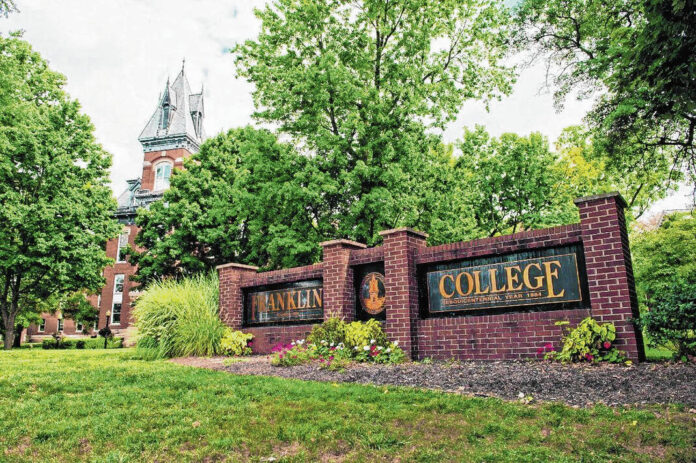The Franklin College student news website focused on legislative issues will again be free and accessible to all.
The college received a $180,000 grant from Lumina Foundation, an Indianapolis-based grant writing organization to facilitate this change. With the funding, TheStatehouseFile.com was able to eliminate the fee charged to other publications to use its work. It will also eliminate the website’s paywall, making content free to read.
The subscription fees and publication fees were previously a way to bring in money to pay student journalists stipends for their work, but the grant will eliminate that need, said John Krull, publisher of TheStatehouseFile.com.
Through TheStatehouseFile.com, which started in 2011, Krull and Executive Editor Colleen Steffen send students to the Indiana Statehouse to cover key legislation. When lawmakers aren’t in session, students continue to cover other aspects of state government, and issues impacting Indianapolis and Indiana as a whole. From 2020 to 2022, students also traveled to Sturgeon Bay, Wisconsin to cover the trial of Thomas Minar, the college’s former president who was convicted on charges of possession of child pornography, using a computer to facilitate a sex crime, child enticement and exposing a child to harmful narrations.
All Franklin College journalism majors are required to spend a semester writing full-time for TheStatehouseFile.com, during that semester students earn 12 credit hours and a stipend for their efforts. Students who aren’t journalism majors can freelance and earn stipends based on how much they write or cover Statehouse issues full-time during the January term, Steffen said.
“We go year-round, 24/7 and publish five days a week. We’re definitely busiest during the legislative session when lawmakers are here but there’s never a shortage of stories,” Steffen said. “Instead of reading books and sitting through classes, they’re at the Statehouse, going through revision after revision and rewriting it until it’s perfect. They have to get an ‘A’ because it’s going out into the public.”
The grant was the product of years of planning between Krull and members of the Hoosier State Press Association, some of Krull’s former journalism colleagues and leaders from Lumina Foundation in an effort to make TheStatehouseFile.com free. In October, members of the Lumina Foundation invited Krull to apply for the grant, Krull said.
“I think it speaks to the urgency of the moment and also to Lumina’s commitment to try and improve not just the quality and presence of local journalism throughout Indiana, but elevating the levels of civic engagement and education in the state,” Krull said.
The grant is part of the launch of the Indiana Local News Initiative, an effort to get news to communities that are lacking local coverage. The initiative also provided grants to Capital B in Gary, Indiana News Service and the Indianapolis Recorder, and will fund the creation of a 25-person Central Indiana newsroom that hasn’t been named yet, according to the Indiana Local News Initiative.
Lumina is one of several organizations funding the grants, with a total of $10 million contributed by various philanthropists and organizations. The need for local news stemmed from research done by the American Journalism Project, said Stephanie Wang, a spokesperson for Lumina Foundation, which gets its funding from an endowment.
“The research identified many gaps in information access among Hoosiers of color and in rural areas,” Wang said. “We’re excited about this innovative approach to a sustainable business model for journalism that serves communities better, too.”
TheStatehouseFile.com stood out among publications because of its ability to get students into the journalism field, Wang said.
“We’re excited to support The Statehouse File to get more Hoosiers access to thorough and reliable reporting to get them engaged in really critical policy discussion,” she said. “The Statehouse File has an innovative model where students can get real-life experience in journalism that gets distributed to news outlets across the state.”
With small communities now having free access to TheStatehouseFile.com, it will enable small newspapers with few staff members to focus their time on covering local issues, Krull said.
“The climate was not great for local newspapers before the pandemic and then that was just brutal for them,” he said. “The goal is we can provide enough content to relieve some of the burden for local news outlets to the point they can focus their energy and resources on covering their local communities and do that more aggressively and completely.”
The grant will also help spread the work of Franklin College students, Steffen said.
“It will put our students’ bylines in a lot more places,” she said. “It’s awesome for them when they try and find jobs because it’s more exposure for them. I think there will be cool opportunities to collaborate with professionals and have other types of content on the website. I’m pretty excited.”
Alumni of TheStatehouseFile.com have gone on to work at the Daily Journal, CNN, Indianapolis Business Journal and the Indiana Lawyer, among other publications.





